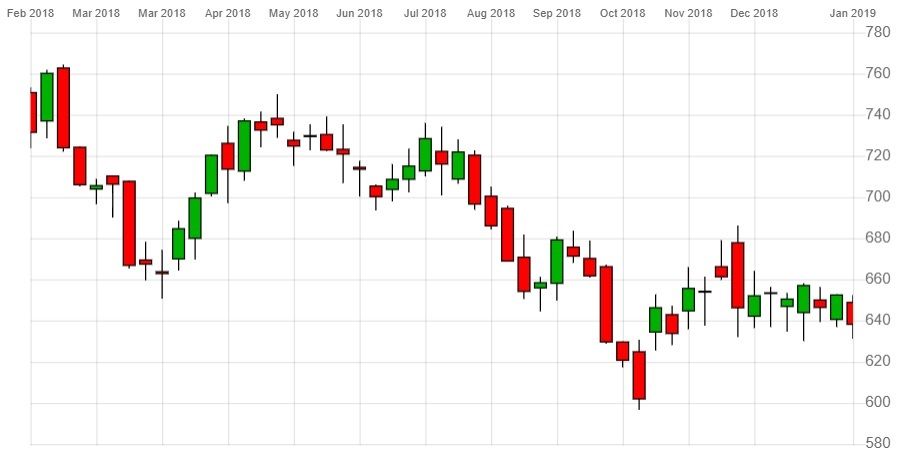While Brexit looks like the biggest macroeconomic threat to UK banks, for the US it is the prospect of a slowing economy. But there are plenty of opportunities for banks to expand and use technological innovation to offer new products and combat security risks.
Interest rates and loan growth
In 2019, changes to interest rates will be closely watched by banking stock analysts. Although rates are currently relatively low, steady increases by the Federal Reserve since the 2008 global financial crisis have aided bank profits. Uptake of new loans slowed in the first half of 2018, partly due to increased competition, followed by an overall slight increase in Q3.
For instance, Goldman Sachs saw its mortgage loans decline by as much as 30% to $493m in Q3 2018, compared to $641m in December 2017. Any further hikes in loans have the potential to boost profits further, although it may hurt loan numbers.
30%
Goldman Sachs mortgage loan decrease for Q3 2018
John McDonald, an analyst at Sanford Bernstein, expects that, in the long run, banks will have another three or four rate increases until they won’t benefit anymore. “There are cyclical companies in there that have enjoyed peak earnings, they’ve enjoyed the benefits of those rate hikes without having to pass on the costs yet and credit costs are at record lows so the margins can’t get much better from here,” McDonald said.
Some analysts argue that growing rates are providing a false sense of the value of these stocks: “What we’re seeing is normal – as interest rates go up, the value of these financial assets are coming down,” says Dick Bove, chief strategist for Rafferty Holdings’ Hilton Capital Management. “Investors don’t have a clear picture as to what the value of bank assets are. Bank capital in real terms is eroding.”
Success of banking stocks will also be largely affected by the US economy. Bank of America Merrill Lynch forecasts growth of 2.7% for US GDP in 2019 and onwards into 2020, and expects it to slow down in the second half of the year as fiscal stimulus fades. A downturn, as many are predicting, will hurt the bottom lines of banks.
“Investors don’t have a clear picture as to what the value of bank assets are. Bank capital in real terms is eroding.” - Dick Bove, chief strategist for Rafferty Holdings’ Hilton Capital Management
Disruption: the rise of digital challengers
Challenger banks had a good 2018, particularly in the UK, with digital startups such as Monzo and Revolut rigorously recruiting customers. Founded in 2015 and officially the fastest-growing unicorn company in Europe, Revolut is valued at $1.7bn and banked $16.8m in 2017, becoming the first digital challenger to break even. It has nearly 3m European customers, and is attracting 8,000 new customers a day.

According to the research firm CACI, digital startup banks are only going to increase in popularity, with banking app transactions expected to rise by 121% over the next five years. As more and more countries establish expertise in finance and regulatory support for open banking, digital disruption will continue to gather pace – and eat into the big banks’ customer base.
But although the upstarts have sharp technology, strong brands and fee-free spending abroad, the old guard have trillions in deposits and, in a bid to stay competitive, are reigning in their fees – an advantage that may just keep them one step ahead.
Banks strike back
Banks are also investing heavily in digital transformation to defend, and even challenge the challengers. “Banks must decide whether to take competition with challenger firms head on, or partner with them to develop and implement the most promising forms of technology internally,” says Andrew Hauser, executive director for markets at the Bank of England. “Doing neither is a risky approach.”
Santander [SAN] is one of the most active European-based banks investing in fintech, funding 21 businesses over the past four years through its venture capital fund InnoVentures, and integrating these businesses into its own operations, as well
as launching its own ‘startup’ app aimed at small business owners.
Santander’s strategy appears to be working. It reported a net profit of $2.2bn for Q3 2018, indicating a 36% year-on-year rise, with many analysts giving its financial earnings a positive outlook over the next three years and with a P/E ratio of around 7.5, it looks like a good value opportunity.
As the pressure amps up from customers for convenience and personalisation, traditional banks are forgoing partnerships in favour of fighting fintech with fintech to stay competitive, which is expected to come to fruition throughout the year.
A new age of corruption
In 2018, there were two major corruption scandals: it was revealed Goldman Sachs [GS] was culpable in money laundering to the tune of $4.5bn linked to the 1Malaysia Development Berhad (1MDB) fund. Meanwhile Denmark’s biggest bank, Danske [DANSKE], helped wash Russian money. Subsequently, regulatory crackdowns and investigations were initiated and shares in each of the banks plummeted.
Consumer and investor confidence in banks is being tested, as these institutions become increasingly interconnected allowing money transfers and the laundering of money to become possible in an instant. The United Nations Office on Drugs and Crime estimates that $2tn is being laundered globally every year.
But it’s not all doom and gloom. Analysts have said that the 1MDB case could have been averted by using blockchain technology as banks would be able to trace how money is moved. Indeed, blockchain’s near invincibility offers a solution to corruption, as no one can add or remove cash from circulation, but we’re still a long way off that yet.
For example, countries such as Spain have been actively combatting corruption by updating its anti-corruption laws and developing blockchain solutions as a preventative measure. Despite these tougher legislations, corruption scandals are likely to still be a challenge throughout 2019.
STOCK SPOTLIGHT
HSBC
Over the past year shares in HSBC [HSBC] – the largest bank in Europe – have slipped by 11%, despite seeing profits in its financial reports due to a double whammy from US-China trade tensions. China is its largest market, and it’s HSBC’s elevated valuation that sent investors running.
Bank of China
The Bank of China [BACHF] ticks a lot of boxes when it comes to dividend investing, with a market cap of $127bn and its stock currently paying out a dividend yield of 5.9%. The bank has also shown improvements across financial earnings reports this year, but its stock will likely be subject to China’s economic woes from trade tensions.
JP Morgan Chase
US heavyweight JP Morgan Chase [JP] had a strong performance in 2018 thanks to a robust economy and the benefits of lowering corporate tax rates in the country. Share prices reached highs of over $118 in February and September last year and, although there was a dip in December, are looking strong for the start of 2019.
BNP Paribas
France’s biggest lender, BNP Paribas [BNPQF] saw its stock prices fall after its Q3 earnings saw a 0.4% drop in revenue to $10.4bn, overshadowing the rise in profit of $2.1bn. At a time of bad loans, Brexit and ultra-low interest rates, the bank is looking for further ways to boost profits.
CMC View David Madden “The flattening of the yield curve does not bode well for the banking system, as banks tend to make more money in a higher interest rate environment, and profitability potential falls in a lower interest rate environment. High-street banks need to keep up with trends in technology as some fintech companies are becoming competitive, and younger clients are far more likely to avail of several service providers. There have been a number of high profile cyber-attacks on major global companies in recent years, and banks need to be at the forefront of technology if they are to keep clients’ assets and information safe.” |
Disclaimer Past performance is not a reliable indicator of future results.
CMC Markets is an execution-only service provider. The material (whether or not it states any opinions) is for general information purposes only, and does not take into account your personal circumstances or objectives. Nothing in this material is (or should be considered to be) financial, investment or other advice on which reliance should be placed. No opinion given in the material constitutes a recommendation by CMC Markets or the author that any particular investment, security, transaction or investment strategy is suitable for any specific person.
The material has not been prepared in accordance with legal requirements designed to promote the independence of investment research. Although we are not specifically prevented from dealing before providing this material, we do not seek to take advantage of the material prior to its dissemination.
CMC Markets does not endorse or offer opinion on the trading strategies used by the author. Their trading strategies do not guarantee any return and CMC Markets shall not be held responsible for any loss that you may incur, either directly or indirectly, arising from any investment based on any information contained herein.
*Tax treatment depends on individual circumstances and can change or may differ in a jurisdiction other than the UK.
Continue reading for FREE
- Includes free newsletter updates, unsubscribe anytime. Privacy policy





